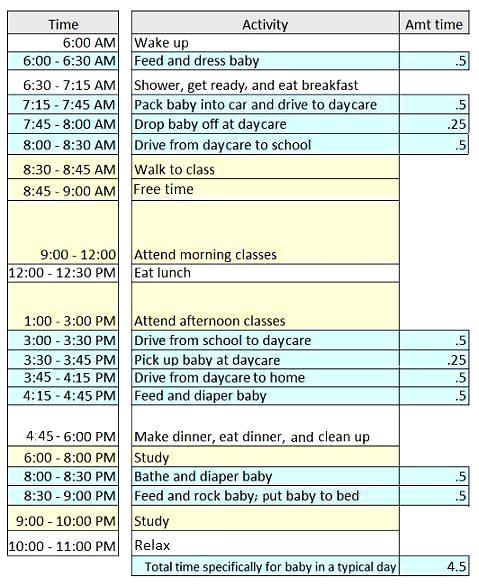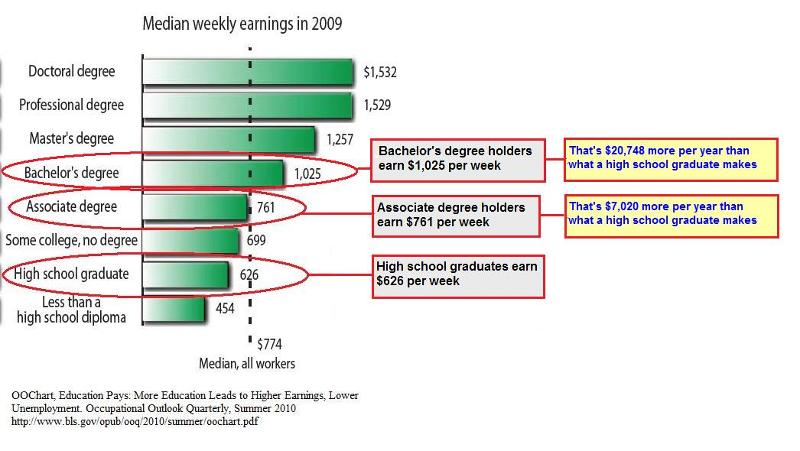Preventing Unplanned Pregnancy and Completing College
Lesson One: Why Should You Care About Preventing Unplanned Pregnancy?
Why Should You Care About Preventing Unplanned Pregnancy?
Lesson One helps you consider the effects of unplanned pregnancy on your educational and life goals.
Lesson One Objectives
At the completion of this lesson, you will be able to understand the impact of unplanned pregnancy on your:
- Significant relationships, and
During this half-hour lesson, you will hear real students -- both men and women -- tell their stories about how an unplanned pregnancy changed their lives. You will also learn some of the facts about unplanned pregnancy among college-age students, as well as some facts about the financial impact of becoming a parent.
The lesson is organized around a series of videos and presentations. Please print or save the Lesson One Study Guide on the right and use it to take notes as you progress through the lesson.
|

|
Before You Get Started
Here are some things to keep in mind before you begin:
- The lesson is organized around a series of videos and presentations. Please print the Lesson One Study Guide and use it to take notes as you progress through the lesson.
- You should download, save, and/or print a copy of the Lesson One Study Guide now.
- This lesson should take you about 30 to 40 minutes to complete. It is best if you can complete it in one sitting. If you must stop before you finish the entire lesson, just note the page you are on, so when you return to the lesson, you can pick up where you left off.
- Throughout the lesson there are short self-check activities such as drag and drop games, flash cards, and matching questions. These are designed to be fun and to help you learn the material; they are not graded.
- IMPORTANT: If you are completing this lesson for course credit, check your course syllabus or ask your instructor about assignment requirements. For example, your instructor may ask you to submit your completed study guide and/or may require that you complete a short quiz.
Technical Information
- It's a good idea to have the latest versions of Flash and QuickTime on your computer. If you have trouble viewing any of the pages in the lesson:
a. Flash: Flash version 10.3 or higher needed.
1. Check your version of Flash.
2. Install the latest version of Flash.
b. QuickTime: Version 7.7 or higher needed.
Download and install the latest version of QuickTime. Note: Once you have downloaded QuickTime, you must install it. Start the install process by clicking "Run." Detailed instructions for installing are at the bottom of the QuickTime download page.
2. Also be sure pop-up blockers are disabled in your browser.
What Students Say About Unplanned Pregnancy
In this video students -- both men and women -- of varying ages talk about the effects of unplanned pregnancy on their lives and/or the lives of their friends.
During the video, facts about the numbers of unplanned pregnancy and facts about how unplanned pregnancy affects student academic success are presented. Take notes on these facts on the Lesson One Study Guide.
This video is about 3 minutes long.
"Student Perspectives"
Self-Check: Did You Catch the Most Important Points?
Play this drag and drop game to see.
Your Educational Goals
An unplanned pregnancy can greatly affect your educational goals.
Have you ever thought about how it might affect:
- your success as a student?
- your daily work schedule?
- your priorities?
Self-Reflection Activity
Your Educational Goals
This is an ideal day for a student who also has a baby to care for.
- Activities in blue represent time caring for the baby.
- Activities in yellow represent time related to school.
- Activities in white represent personal time or time caring for family.
Unfortunately, not everyone would have the luxury of an ideal schedule like this. For example, many students would have to fit a part- or full-time job into this already packed schedule.
What might your day look like if you had a baby to care for while also going to school? What would you have to add in, and what would be the first items you'd take out?

Your Social Life
How does being a parent affect your social life?
Listen to these students talk about what it really takes to be good parents.
This video is about 3 minutes long.
"What it takes to be a parent"
This video is from session six of the p.a.p.a. (Parenting and Parenting Awareness) series and was used with the permission of the Office of the Attorney General of Texas.
Self-Check: "What It Takes to Be a Parent" Video
Your Significant Relationships
The impact of an unplanned pregnancy on a romantic relationship
Think an unplanned pregnancy will bring you closer to your significant other? Listen to what the students in this video have to say.
This video is about 3 minutes long.
"9 Months"
Used with the permission of Professor Tamra Ortgies-Young, Georgia Perimeter College. Edited (with permission) by The National Campaign to Prevent Teen and Unplanned Pregnancy.
Your Significant Relationships
The impact of an unplanned pregnancy on a romantic relationship
Did you know?
- Among mothers who were single at the time of conception, 70% were single two years after the birth.*
- More than one-third of women who were living with their partner at the time of conception and whose pregnancy was unplanned broke up with their partner by the baby's second birthday.*
- Among couples who remained together after the birth, both mothers and fathers reported significantly lower relationship happiness if at least one member of the couple did not plan the pregnancy.**1
- Relationship conflict, reported by both mothers and fathers, was also significantly higher if at least one member of the couple reported that the birth followed an unplanned pregnancy.**2
Source:
*The National Campaign to Prevent Teen and Unplanned Pregnancy | DCR Report, Section G: Stability of Parent Relationships Following an Unplanned Pregnancy and Birth (2008-2010)
**The National Campaign to Prevent Teen and Unplanned Pregnancy | DCR Report, Section H: Relationship Quality of Parents Who Report an Unplanned Pregnancy and Birth (2008-2010)
1. Compared to those couples who both agreed that the pregnancy was planned, net of other background characteristics.
2. Compared to those couples who agree that the pregnancy was planned, net of other background characteristics.
Your Significant Relationships
Telling your parents you're expecting a baby
Telling your parents that you are expecting a baby might be difficult.
Listen to these students talk about having that conversation with their parents.
This video is about 2 minutes long.
"Telling your parents you're expecting a baby"
This video is from session two of the p.a.p.a. (Parenting and Paternity Awareness) series and was used with the permission of the Office of the Attorney General of Texas.
Your Finances
How much does it cost to have a child?
Having an unplanned pregnancy would affect your financial situation.
Visit the "BabyCenter First Year Baby Cost Calculator" for an estimate of how much a baby might cost in its first year.

Your Finances
How much does it cost to raise a child to age 18?
- To raise a child to age 18, you can expect to spend somewhere between $164,1601 and $407,820.2*
- A number of factors affect exactly how much it costs to raise a child, including where you live, whether or not you are a single parent, and what your income level is.
- (Optional) If desired, you can estimate what it would cost you to raise a child in your geographical area and in your specific circumstances by going to the USDA Cost of Raising a Child Calculator. (Click on "Click here to start" on the right, then enter your answers and then click "Calculate.") Note: This calculator shows the yearly (annual) cost of raising a child; to estimate how much it would cost you to raise a child to age 18, multiply the yearly figure by 17 (for 17 years).
*Does not include the cost of a college education for your child, which could range from $20,000 to several hundred thousand dollars for four years.
Source: Lino, Mark. (2014). Expenditures on Children by Families, 2013. U.S. Department of Agriculture, Center for Nutrition Policy and Promotion, Miscellaneous Publication Number 1528-2013.
http://www.cnpp.usda.gov/Publications/CRC/crc2013.pdf.
1. Single parent families with before-tax income less than $61,530
2. Husband-wife families with before-tax income more than $106,540.
Your Finances
The benefits of finishing your education
It's obvious that having a child is expensive! How would you pay for a child, particularly if you have one before you finish your degree? As we heard earlier, many students who have a child (or another child) while in school struggle to finish their degrees. Postponing having children (or additional children) while in school not only puts you in a better position to complete your degree, but in a better financial position to support a family.
This chart shows how your earning power increases as your education levels increase.

Self-Check: Your Finances
Pregnancy and Parenting Resources
Perhaps you are pregnant, parenting, or are ready to become a parent or expand your family. Here are some resources to help you learn more about how to have a healthy pregnancy, as well as receive support and tips for parenting.
We hope that the next two lessons will provide some helpful information about ways to space and postpone any additional pregnancies, giving you and your partner the power to decide if, when, and under what circumstances to get pregnant.
Healthy Pregnancy
What to Expect. It’s not just a book! For information about preconception health (steps you can take to get healthy before getting pregnant), how to stay healthy during pregnancy, a week-by-week pregnancy countdown, and more, check out What to Expect.
HealthCare.gov. (Also available in Spanish.) Pregnancy is considered a life-changing event, which means even if it's not open enrollment time, you may be able to sign up for coverage through the Health Insurance Marketplace.
Medicaid. If your income is below a certain level, you may qualify for Medicaid health care coverage.
Parenting Tips and Support
ParentFurther. For some great resources on preparing for the future, building a positive relationship with your child, and understanding ages and stages, check out ParentFurther.
National Diaper Bank Network. By focusing on diaper need, the National Diaper Bank Network (NDBN) works to meet the basic needs of all American children and families.
Office of Child Support Enforcement. Information for single parents on getting child support.
WIC. The Special Supplemental Nutrition Program for Women, Infants, and Children (also available in Spanish) helps low-income women and children up to age 5 with food, health care, nutrition education.
Child Welfare Information Gateway. For those in the child welfare system, these resources from the US Department of Health and Human Services will be of particular interest.
Lesson One Complete
You have reached the end of Lesson One: Why Should You Care about Preventing Unplanned Pregnancy?
If you completed this lesson for course credit, check your course syllabus or consult your instructor to find out if you are required to submit an assignment and/or take a short quiz.
Click here to proceed to Lesson Two: How much Do You Know About Sex and Birth Control?



